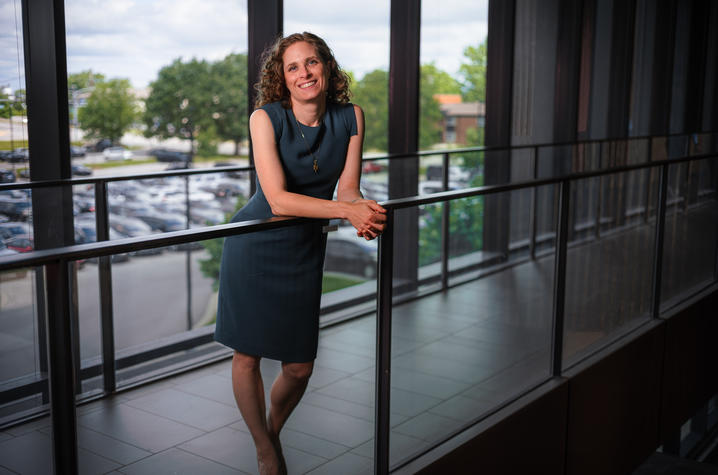Krystle Kuhs: 2025-26 University Research Professor Q&A

UKNow is highlighting the University of Kentucky’s 2025-26 University Research Professors. Established by the Board of Trustees in 1976, the professorship program recognizes excellence across the full spectrum of research at UK and is sponsored by the Office of the Vice President for Research.
LEXINGTON, Ky. (July 29, 2025) — Krystle Kuhs, Ph.D., professor in the Department of Epidemiology and Environmental Health in the College of Public Health, has been honored as a 2025-26 University Research Professor.
As a molecular epidemiologist, Kuhs focuses on creating advanced molecular tools to predict risk, treatment response and recurrence in head and neck cancers, with a special emphasis on those caused by human papillomavirus (HPV).
Kuhs, a member of the UK Markey Cancer Center, currently leads three large clinical studies evaluating biomarker-based screening for early detection of HPV-driven throat cancer, a rapidly increasing cancer that disproportionately affects Kentuckians and for which no screening methods exist.
Kuhs has secured more than $7 million in research funding and currently leads multiple projects, including two awards from the National Institutes of Health and two awards from the American Cancer Society and Department of Defense. She has published more than 50 articles in leading journals, including JAMA Oncology and Journal of Clinical Oncology, with over 1,600 citations.
Kuhs joined UK in 2016. She spoke with UKNow about her latest honor as a University Research Professor in this Q&A.
UKNow: What does it mean to you to be recognized as a University Research Professor?
Kuhs: I feel incredibly honored to be recognized as a University Research Professor. Not only is this an incredible career milestone, but it is also a reflection of the incredible support I’ve received from my colleagues, team and university community, who make the research possible.
UKNow: How will the professorships program advance your research?
Kuhs: Our team has found an alarmingly high incidence of HPV-associated cancers in Eastern Kentucky. In preliminary studies, we found that HPV viruses circulating in Eastern Kentucky are different than those circulating in the rest of the Commonwealth. With the funds from the professorship, we will partner with investigators at the National Cancer Institute to sequence the viral genomes to determine whether the HPVs circulating in Eastern Kentucky are genetically more aggressive and thus more likely to cause cancer.
UKNow: What inspired your focus on this area of research?
Kuhs: My earliest childhood memories are of my dad fighting and ultimately succumbing to an aggressive infection-associated cancer. My scientific career has been spent better understanding these cancers, and, most importantly, developing methods to find them early so that other little girls do not have to grow up without their fathers.
UKNow: How does your research impact Kentucky?
Kuhs: Kentucky has one of the highest rates of a type of throat cancer caused by HPV infection. While most people associate HPV infection with cervical cancer in women, 85% of HPV-driven throat cancers occur in men. Not only that, but more HPV-driven throat cancers are diagnosed in the U.S. each year than cervical cancer. While we have very effective methods of detecting cervical cancer early in women, we have no methods for early detection of throat cancer in men. Our group has developed a new screening method for throat cancer. We are leading several large screening studies and have recruited thousands of men across Kentucky to evaluate the accuracy of this new approach. To date, we have found several throat cancers among asymptomatic men. While these studies are ongoing, our preliminary data suggest that this new screening method may be more accurate for detecting throat cancer than cervical cancer screening. Currently, there are only three cancer screenings available in clinics (cervical, colorectal and lung), our group hopes to develop the fourth.
About the University Research Professors
Each year, the University of Kentucky Board of Trustees approves a cohort of faculty as University Research Professors. The distinction recognizes excellence in work that addresses scientific, social, cultural and economic challenges in Kentucky and the world.
College leadership developed criteria for excellence within their area of expertise and then nominated faculty who excelled at these criteria. Each University Research Professor receives a one-year award of $10,000.
As the state’s flagship, land-grant institution, the University of Kentucky exists to advance the Commonwealth. We do that by preparing the next generation of leaders — placing students at the heart of everything we do — and transforming the lives of Kentuckians through education, research and creative work, service and health care. We pride ourselves on being a catalyst for breakthroughs and a force for healing, a place where ingenuity unfolds. It's all made possible by our people — visionaries, disruptors and pioneers — who make up 200 academic programs, a $476.5 million research and development enterprise and a world-class medical center, all on one campus.




